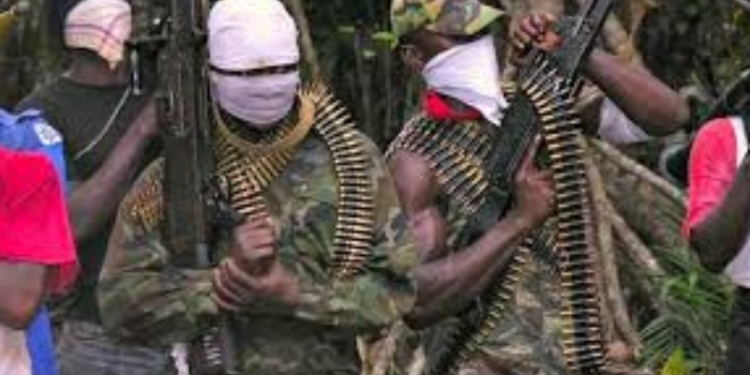- Recently, Nigeria Defence Headquarters announced emergence of new terrorists group, Lukarawas, also known as Mujahidin
- New terrorists group operates in Kebbi, Sokoto and other North east zone
- Nigeria Defence Spokesperson says the Nigerian Army is equal to the attack, promises early annihilation of the group
On Thursday, November 7, the Nigerian Defence Headquarters confirmed that a new terror group named Lakurawa also know as Mujahidin has emerged in Nigeria and is operating in the Northwest region of the country.
According to the Spokesman of Defence Media Operation (DMO), Major General Edward Buba, who broke the news during a press briefing in Abuja, the terrorists are not of Nigerian origin but have majorly been operating in Northen Sokoto and Kebbi States.
General Buba also assured Nigerians that the military has intensified its operations and will flush out the terrorists to ensure the safety of the people.
Since the press briefing by the Defence Headquarters, there has palpable fear in the country over the current security challenges palpitated by the new terror group.
WITHIN NIGERIA findings showed that for close to five years now, Nigeria and indeed the West African Sub-region has grappling with security challenges in the form of kidnapping, banditry and killings across the region.
Nigeria rating in the Global Terrorism Index(GTI)
In March 2024, Nigeria finds itself once again in an uncomfortable position with the ongoing battle against terrorism with its recent ranking in the Global Terrorism Index (GTI) underscoring the persistent challenges the nation faces in combating extremism.
The GTI, published annually by the Institute for Economics and Peace, serves as a comprehensive analysis of the impact of terrorism worldwide, assessing factors such as terrorist incidents, fatalities, injuries, and property damage.
However, with a score of 7.575, Nigeria’s placement in the index signals a continuing struggle against terrorism within its borders raising concerns both domestically and internationally.
Nigeria’s ranking among countries such as Afghanistan, Syria, and Somalia – all known for their protracted conflicts – highlights the severity of the situation within the nation.

According to GTI, “Nigeria recorded its first increase in terrorism in three years in 2023, with total deaths rising by 34 percent to 524. This year marks Nigeria’s highest death toll since 2020, driven by a surge in conflict between ISWA and Boko Haram. If the conflict between these two groups was excluded, terrorism deaths would have declined by 18 percent”.
Findings showed that one of the most alarming aspects of Nigeria’s position in the GTI is the longevity of its struggle against terrorism. Despite concerted efforts by the government and security forces, the threat of extremist groups such as Boko Haram and the Islamic State West Africa (ISWA) continues to loom large over the country.
The report highlighted “deaths from terrorism rose to 8,352 in 2023, a 22 percent increase from the prior year”.
Also, Nigeria is one of ten countries responsible for 87 percent of global terrorism-related deaths, with its share amounting to 6 percent.
While Burkina Faso, Israel, Mali, Pakistan, Syria, Niger, Somalia, Myanmar, and Cameroon account for 23 percent, 14 percent, 9 percent, 8 percent, 8 percent, 6 percent, 5 percent, 4 percent, and 3 percent of global terrorism-related deaths respectively, the rest of the world collectively represents 13 percent.
According to the Global Terrorism Index report, (GTI), the following eight countries rank high in terms of terrorism.
Burkina Faso’s score of 8.571 indicates escalating terrorism in the Sahel.
Israel’s high ranking of 8.143 showcases global terrorism’s complex dynamics.
Mali’s score of 7.998 reflects ongoing instability post-rebellion.
Pakistan’s score of 7.916 shows an entrenched fight against terrorism.
Syria’s ranking of 7.890 mirrors multifaceted conflict.
Afghanistan’s score of 7.825 signifies persistent post-conflict challenges.
Somalia’s ranking of 7.814 highlights security fragility amid civil war.
Nigeria’s placement at 7.575 reaffirms its status as a terrorism epicenter in sub-Saharan Africa.
Nevertheless, with the Boko Haram, ISWA and banditry activities still very much active in the country and spreading across the sub-region, the emergency of new terror group, lukawaras is a inexplicable security set back in the region.
Where did Lukarawas come from?
By and large, as noted by Buba, the terrorists are not from Nigeria. They are a cross-border terror group whose members come from Mali, Libya, and Niger. They gained entrance into Nigeria through the borders it shared with the two mentioned countries, and this was only possible due to weakened border security, caused by the coup in Niger Republic. With this explanation, it could be deduced that the new terror group was imported into the country through insecurity in other neighbouring countries.
How did Niger coup contribute to the emergency of Lakurawas?
The Niger coup might have come and gone but the security impacts have continued to rear their ugly heads in the sub-region.
Before now, Niger, along with other countries in the Lake Chad Basin (Cameroon, Chad, and Nigeria) were part of a Multinational Joint Task Force (MJTF) that worked closely to fight terrorism in the area, but a coup affected their operations.
In July 2023, factions in Niger’s military overthrew the government of the country and suspended its constitution. To pressure the military to back down and restore democratic government, the Economic Community of West African States (ECOWAS) which Niger belongs, imposed some sanctions on the country and suspended it from the regional bloc. As a result of this, Niger pulled out of the MJTF, and this led to weakened border security which gave the Lakurawa terrorists a way in.
Motives of the Lukarawas terror group
Lakurawa is a faith-based terrorist group which shares similar beliefs with Boko Haram, and just like the dreadful group that has terrorised Nigeria’s Northeast for years, Lakurawa seeks to uphold the teachings of Islam wherever it is. Since they set up base, they have tried to impose Sharia law in the communities where they operate.
When did the terrorists enter Nigeria?
WITHIN NIGERIA gathered that the terror group has been in Nigeria before now; As far back as 2018, they were reportedly invited by some communities to help with their bandit problem. Lakurawas came in, fought off the bandits and restored some calm in the communities but settled down and attempted to impose Sharia law on the locals instead of returning to their countries– things remained that way until the Nigerian military and the Department of State Services (DSS) conducted a joint operation in 2019 that sent them packing.
There is no consensus as to when Lakurawa re-entered Nigeria again, but the earliest mention of the group by the media can be traced back to July 2023 thanks to a complaint by Sani Yakubu, a lawmaker representing Tangaza/Gudu Federal Constituency of Sokoto State in the House of Representatives.
During a plenary session, Yakubu complained that both local bandits and the Lakurawa terrorist group were terrorising his constituency and that swift intervention was needed. “The Lakurawa who claimed to be jihadists from Niger, Mali and Libya and the local Bandits terrorising the area. The two used to be sworn enemies, but have now joined forces, making it more difficult for the deployed security operatives to address the insecurity in the general area,” Yakubu said.
Their level of terrorism in communities in Sokoto and Kebbi
The terrorist group has caused harm in the communities they penetrated. According to reports, the Lakurawa terrorist group has done the following since they began their operations:
They have beat up young people who shave their beards, have on a different hairstyle, or listen to music.
They fought, defeated and indoctrinated local bandits and have become one with them
They collect religious taxes from locals and punish those who refuse to pay by seizing their cows
They have robbed locals of their money and some other belongings
They have offered some young people the sum of 1 million to join their operation.
How dangerous are they?
According to eyewitness accounts of locals in Sokoto suggest that they have sophisticated weapons, use drones, and conduct coordinated attacks against government officials.
The Nigerian Defence Headquarters say they were only able to gain grounds in the communities because they started off by defending communities against bandits and were, as a result, accommodated by locals who assumed the group had good intentions for them. Locals initially accommodated them, thinking they had good intentions for them, only reporting their presence when the group started terrorising the
Where is the terror group?
The Lukarawas terrorist group is currently hiding out in Tsauni forest, a large area spanning across Kebbi and Sokoto; however, the Nigerian military is actively conducting operations to flush the terrorists out. It has also declared nine people believed to be members of the terror group wanted. Their names are Abu Khadijah, Abdurrahman, Dadi Gumba (also known as Abu Muhammed), Usman Shehu, Abu Yusuf, Musa Wa’a, Idris Taklakse, Ibrahim Suyeka, and Ba Sulhu.
Recent activities of the group
On November 9, 2024, at least fifteen people were killed and several others wounded when new terror group Lukarawas attacked a rural community in northwest Kebbi state after stealing livestock, residents said.
Witnesses said the insurgents arrived on motorbikes in the village of Mera in Kebbi’s Augie local government area on Friday and attempted to seize cattle from the villagers.
When residents resisted, gunfire erupted, leaving fifteen dead and forcing others to flee. Two insurgents also died, the witnesses said.
A local traditional ruler Samaila Mera said this was the first attack by the group in the area.
State deputy governor Abubakar Tafida, who attended a funeral for the victims on Saturday, said the government was working closely with the security agencies to prevent further attacks.
Implications on the sub-region
Nigeria and indeed West Africa sub-region have been grappling with a long-running insurgency. In the northeast Nigeria, these terrorists group are very much active and primarily driven by the Islamist armed group Boko Haram and its offshoot Islamic State West Africa Province (ISWAP). The emergence of the new terrorists group will no doubt worsen the security situation in the sub-region.
For almost two decades now, Boko Haram insurgents have held the region in the jugular and killed over thirty thousand persons.
Again, the economic impacts of the new terrorists group stems from the fact that it will further contrast the free movement of goods and services in the region.
Furthermore, as indicated before, the activities of the new terror group which involves keeping for ransom will incite more fear in the already beleaguered sub-region.
WITHIN NIGERIA findings showed that when Boko Haram insurgents emerged in 2007, nobody took them serious until they escalated their attacks so much so that thousands have gone to their early grave as a result of their suicide bombing and nefarious acts.





Discussion about this post